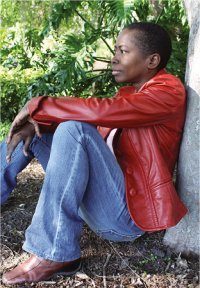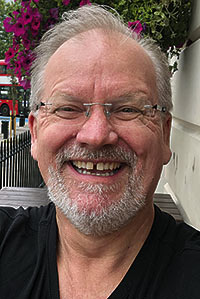Daniel José Older: Crossroads

Daniel José Older was born January 18, 1980 in Cambridge MA, and grew up in Boston. After high school he moved to California, where he worked as a bike messenger and waiter, ‘‘living the romantic writer life.’’ He attended Hampshire College, and then settled in Brooklyn NY. He is a composer and musician, has an MFA, and worked as a paramedic for ten years before becoming a full-time writer.
Some of his stories were collected in Salsa Nocturna (2012). First novel Half-Resurrection Blues (2015) is an adult fantasy, and began the Bone Street Rumba series, which will continue in the forthcoming Midnight Taxi Tango (2016). Shadowshaper (2015) is YA fantasy. He guest edited the June 2014 issue of Crossed Genres and co-edited Locus and World Fantasy Award-nominated anthology Long Hidden (2014) with Rose Fox.
Excerpts from the interview:
‘‘During my last semester in college, I took an EMT course, because I knew I needed a job. I wanted to write, and writing was a natural thing for me, but I needed more information to know what I was writing about, and to make sense of the world. I was very radicalized in college, and thinking deeply about who I was in the world. I wanted to be able to make sense of all that on the page. I ended up in Brooklyn, where I took a paramedic course. Most people don’t know those are two different things. Paramedic is a much more advanced level of intervention than EMT. It’s a year of training to be a medic, and you do very in-depth work on pharmaceuticals and physiology. You’re doing in the field what they’ll do in the ER – in that first half hour of many medical situations, you’re just doing it. A lot of times we’d get someone who was maybe 20 minutes from death, and bring them in, and they’d be fine. Doctors would be like, ‘Why are they here?’ It’s hilarious how deeply the field is misunderstood in a lot of ways. Paramedics aren’t doctors, but they function as street doctors, essentially.”
…
‘‘I was a Star Wars kid. I always loved genre, Lord of the Rings, Dune, Foundation, a lot of the classics. I got away from it as I was growing up. I came back in my twenties, to Harry Potter and Octavia Butler, which is where I’m situated in the world as far as being a writer. In 2008, around the end of the Harry Potter series, I was reading the last couple of books. I read all of Octavia’s work, too. I read The Brief Wondrous Life of Oscar Wao by Junot Díaz. I read a Walter Mosely book, a collection of stories about Easy Rawlins. I always say that the combination of those books is what made me a writer, along with Stephen King’s On Writing, which is fantastic.”
…
‘‘I wasn’t very conscious of the urban fantasy genre when I started Shadowshaper. I was just writing magic in a city. I’ve always lived in a city, and it felt true. I think we miss opportunities when we ignore power, or fudge the complexities of power. A city is a power-laden place, and it’s so obvious to me because I have that perspective. I’ve lived in it, I’ve worked as an organizer, and as a paramedic. I’ve seen the city from all of these perspectives that are complicated by power. A city is a crossroads – that’s something that always rings true to me, because there are all these different forces smashing into each other. Forces of race and gender and class, history and present and future and industry. All of these things are happening at a crossroads. Not to mention people at a crossroads, personalities, cultures, and change. It’s very dynamic.”
…
‘‘I think science fiction is changing quickly. I don’t want people to think that means we can stop trying to make change, or feel self gratified, like, ‘We did it!’ But you can tell it’s changing because people who are on the way out are upset and uncomfortable, because they’ve always been catered to. People have always fallen over themselves to move out of their way, and people are not doing it anymore, and it’s uncomfortable for them. Like when kids are spoiled and someone takes their toys away or reminds them they live in reality, and they’re like, ‘What?’ The whole concept of sci-fi or fantasy not being a political or imperial endeavor is absurd – it always has been.
‘‘Most people who aren’t straight white men read fantasy and science fiction with certain protectors up, knowing we’re about to cringe. Let’s talk about the word ‘offended,’ because that’s the word people use to describe what’s going on. ‘Offended’ doesn’t have shit to do with it. I don’t get offended. I don’t want my people to be erased! I don’t want my people to be demonized. Especially kids. They internalize that, and feel like they can’t be protagonists. The people who are really offended are white men who suddenly see themselves as not centralized, and they’re offended. Be offended, that’s totally cool. I’m not okay with the people who are always erased being erased again and again. It has nothing to do with me being offended. Where does that leave us? Yes, we are seeing a renaissance of counter-narratives in fantasy and sci-fi, and that needs to happen, it’s good for literature. On top of being bad for humanity, that old shit is cliché. White savior narratives are cliché. They’re boring. It wasn’t good writing in the ‘50s, and it’s not good writing today. I think that needs to be said. It’s a craft failure on top of a human failure.”
…
‘‘I’m halfway through writing the third Bone Street Rumba book. I’m really enjoying writing it. It’s a war book. I love epic fantasy war books. I’m interested in the idea of recontextualizing the epic fantasy war book into an urban setting. I love the Malazan books. I love George R.R. Martin’s work. They’re total pleasure reading for me. Half-Resurrection Blues is in that very specific noir genre. Everything in that series is. It gets more expansive as it goes out. It’s funny, I wrote Salsa Nocturna first – it’s my first book that came out, and it’s a collection of short stories – but they take place after Midnight Taxi Tango, which is book two of the Bone Street Rumba series. Midnight Taxi Tango ends on the day that Salsa Nocturna begins. The world expands as it goes. That’s one of the things I love. I didn’t totally set out to do this, but it happened naturally.”
…
‘‘Half-Resurrection Blues was optioned by Anika Noni Rose. She’s just creatively brilliant and really smart; we always have fascinating conversations about literature and the series itself and all this stuff. I’m really excited to see what happens. Shadowshaper is exploding right now. I’m taking that all in at this moment. The New York Times just reviewed it. It’s so amazing to me to be sitting right here, just breathing. I started the book in 2009. It was rejected by 40 agents. Of course, it’s been edited since, but it was always the book it was, on some level, and Sierra was certainly always who she was. I don’t say that with any bitterness. I found an amazing agent. I love where I am. I love the journey that it has taken to get there. I really became a writer, writing this book. Cheryl Klein, my editor at Scholastic, has taught me so much in that process. Now I knock out at least the basic gist of the book more or less in the first draft. But Shadowshaper, I had it in cartoon outline across my office wall for years. I would chop it up, put it over here. I have pictures of it, but it would be amazing to do a stop motion of every time it changed. I moved apartments and had to put it back up. I used sticky notes. It was a six and a half year process. There was a point where I knew the book would be out in the world, but it didn’t feel real. Edits become simple when you feel you’re in another round of infinite edits. Now it was like, you have to make the decision: ‘This is what it’s going to be.’ That was hard. I was so used to changing shit and trying different things. I love the book. I can really say I stand by every single word. I don’t know if everyone feels that way about their work.”
Read the complete interview in the September 2015 issue of Locus Magazine. Interview design by Francesca Myman.





